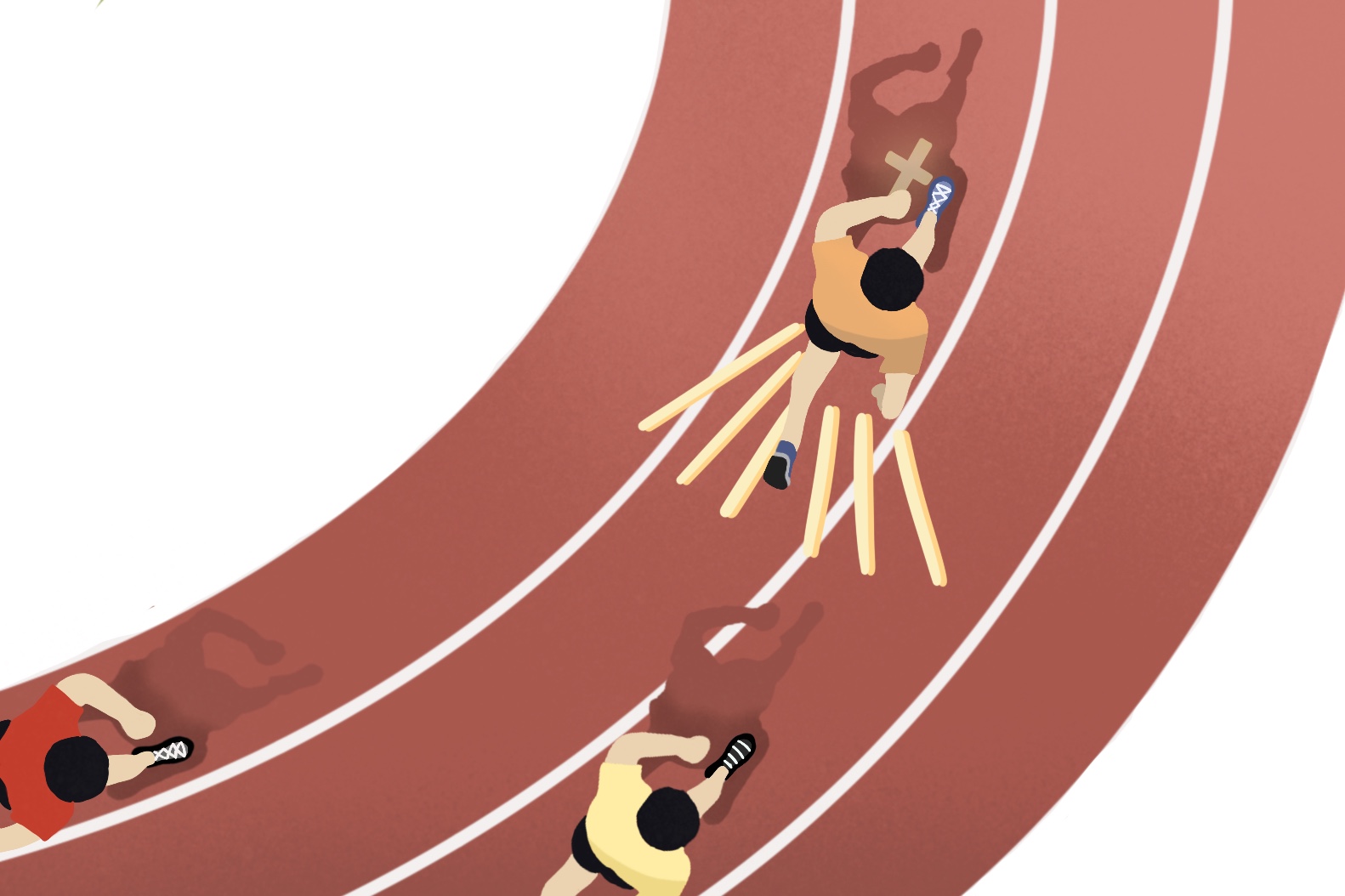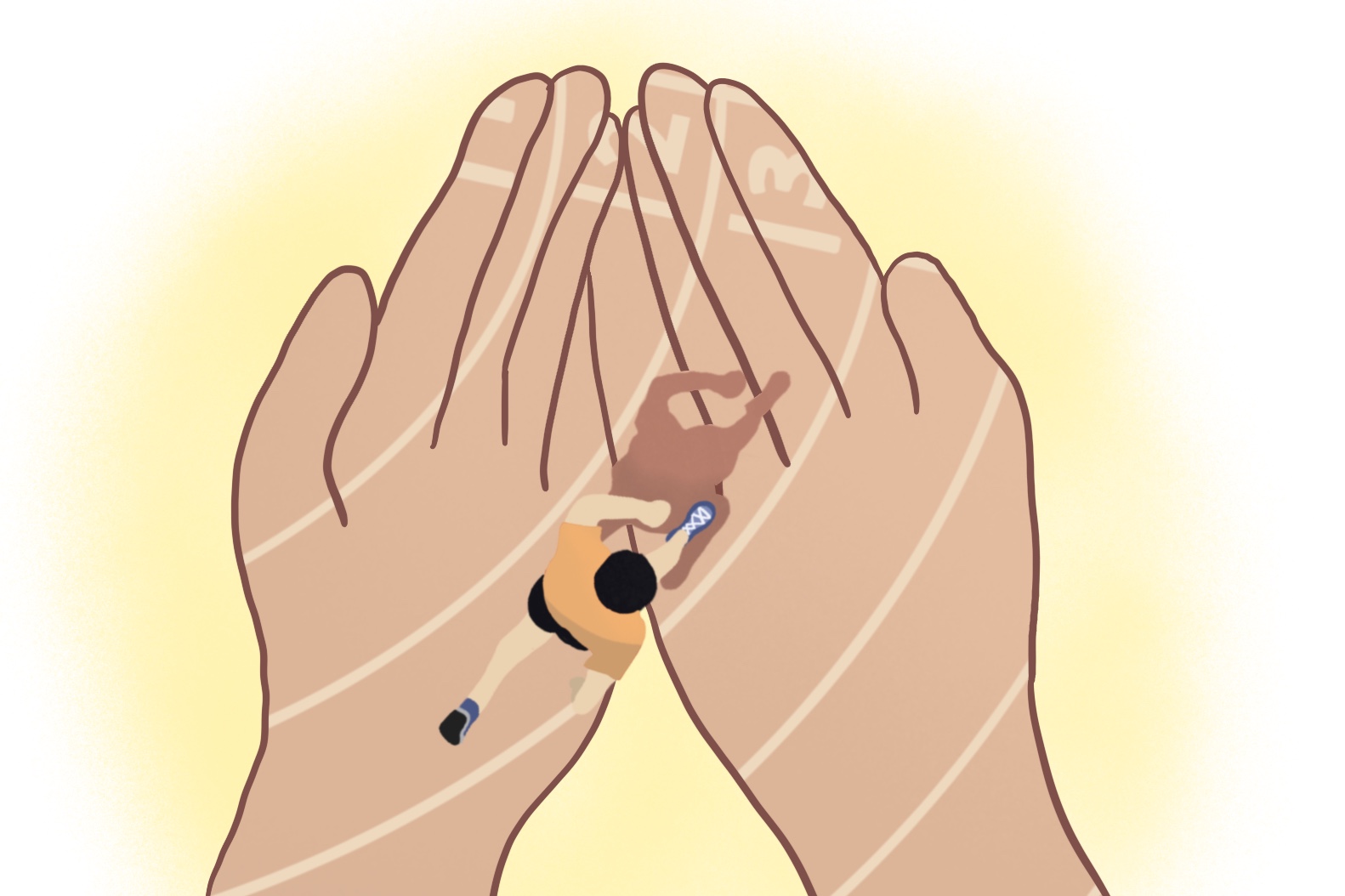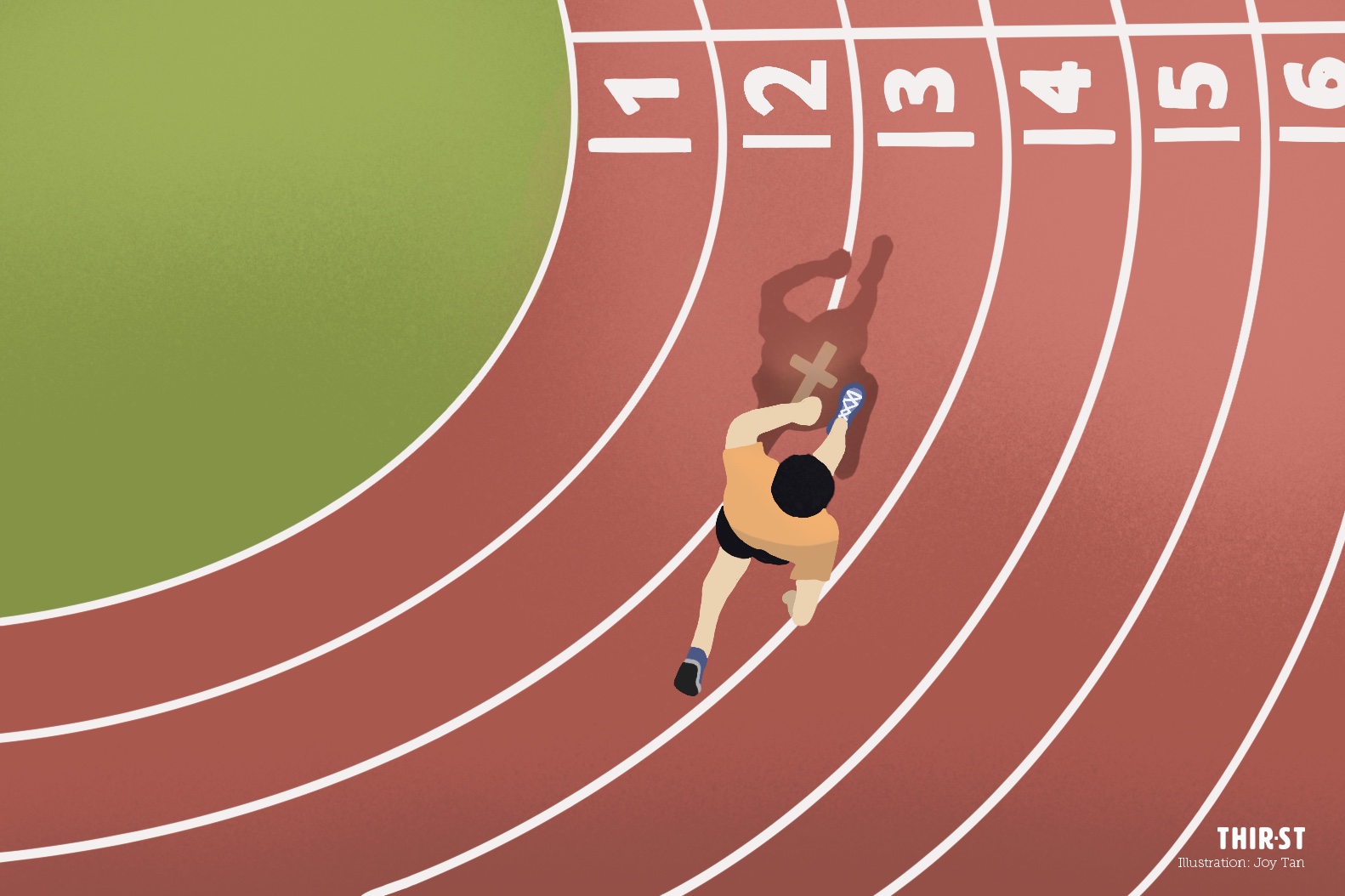Growing up as a young athlete, there were many issues I ran into that I didn’t know how to reconcile with my faith.
For instance, I’ve always wondered what an athlete’s prayer should sound like, having heard one too many “God, grant our team the win so we can glorify you” prayers.
I also remember coaches saying I wasn’t aggressive enough, and being unsure of how to feel when teammates got themselves fired up by cursing and swearing to lift heavier weights.
If you are a Christian, you should be the best athlete. Your motivation is always constant.
Just how were faith and sports supposed to fit together?
Unanswered questions like these were the reason why I was glad to have the chance to sit down with Ivin and Jia Xian from Cru Singapore’s Athletes in Action (AIA) ahead of the Tokyo Olympics.
AIA focuses on discipling Christian campus sportsmen as well as national team players in becoming Total Athletes. In other words, they are concerned with physical, mental and spiritual growth.
Here are some of my takeaways from my chat with them, insights that helped me make sense of what a Christian competing in sports should look like.
UNDERSTAND WHAT MOTIVATES YOU
Sports can’t exist without competition. But competition has an ugly side.
We’ve all seen cheesy movies where one coach’s game plan would be to take out the other team’s star player. That might be an extreme example of competitiveness, but as an athlete, it’s easy to let competition drive you negatively.
“Competition brings out the beauty of sports. But ‘competitiveness’ is a tainted word. People think ‘competitiveness’ is like elbowing each other, playing cheat, a winning-at-all-cost kind of mentality,” began Jia Xian, when I asked how a Christian athlete should handle competition.
But in order to make sense of competition, Jia Xian’s advice is to ask yourself the question: “What motivates you?”
“Was it affirmation from your teammates, your own need to win, or even your own need not to lose?” offered Ivin.
“Is it to prove to your coach, to prove to your parents or to prove to yourself? Is it to find favour among the fans? Is it to impress a girl? Is it to DSA straight to university?”
To Ivin, the answers to those questions are important because they “determine your actions” as an athlete and will be what serve as your motivation.
Indeed, athletes are driven by all sorts of motivations like fame, money, power and applause.
Yet, as Ivin pointed out, none of these motivations are a constant.
“What if, like right now during COVID, there were no fans? What if your motivation was always to play for the fans so that they would be wowed by you?
“No one is clapping when you drive and score the touchdown now.”
To Ivin, the only constant motivation an athlete can have is God’s grace and love.
When an athlete is motivated by God’s grace and love, he or she is able to compete with freedom.
Explaining what being motivated by God’s grace and love looks like, Ivin summarised a lesson from AIA’s Ultimate Training Camp last year, drawing from the parable of the prodigal son.
In the parable, the younger of two sons had asked his father for his inheritance, squandering it away in a life of debauchery before returning empty-handed.
Meanwhile, the older son had stayed to work in his father’s estate, and was resentful of his father when he welcomed his wayward brother home.
Ivin explained that the youngest son was motivated by pleasure when he left. But the older son was no better. He wasn’t motivated by love for his father, but performance.

To Ivin, most athletes are motivated either by either pleasure or performance, or something in between.
But when an athlete is motivated by God’s grace and love, he or she is able to compete with freedom. Freedom from the expectations of coaches, teammates and fans.
Said Ivin: “I’m free to make mistakes. I’m free from people’s view of me. I’m free to play how God has made me to play… I focus my attention, not on myself or the criticism, but on who God says I am.”
Competing in sports, motivated by God’s grace and love, is an act of worship towards God. When one does so, God is able to transform the way an athlete plays from the inside out.
Listening to godly motivation as explained by Jia Xian and Ivin, I found that having such a baseline proved key to answering lot of my subsequent questions on issues such as ambition and aggression.
QUESTION: SHOULD I WANT TO BE THE BEST?
Ambition is a tricky thing. There’s nothing wrong with ambition in itself, but it can be easily fuelled by pride or a need for applause.
That’s why Ivin and Jia Xian emphasised the importance of God’s love and grace being an athlete’s motivation.
In that light, the motivation behind wanting to be the best no longer becomes selfish or self-aggrandising, but is honed into a desire to be a good steward of the gifts that God has given us.
Ivin shared: “If God gives you talent in sports, you need to be a good steward of it. God made who you are so you need to be all of what God wants you to be.
“Ephesians 2:10 tells me that God has given you the gifts, He had a plan for you, even before you knew it, and He will give you what you need to get there. If God has wired you to be a sportsman, then it’s stewardship to be the best sportsman.”
Certainly, not everyone is born naturally athletic or talented. It’s an athlete’s job then, to grow these talents and abilities and glorify God.
“If your motivation is God’s love and God’s grace, a Christian athlete should be the athlete training the hardest, the best teammate, willing to put his teammates before himself, willing to do whatever it takes to bring honour to God,” reflected Ivin.
“So actually, if you are a Christian, you should be the best athlete. Your motivation is always constant.”
QUESTION: SHOULD I PRAY TO WIN?
God grant our team the win so we can glorify You. When I kept hearing that same prayer over and over, I started to realise that our opponents were probably praying the same prayer.
Who was God listening to then? The one who prayed harder? The one who was more fervent? The one who was more righteous?
However, Ivin pointed out that thinking that way makes for poor theology that is based on merit.
Instead, he suggested that athletes pray so they can do their best as an act of worship.

Ivin elaborated: “If your best at that time could be a 10 out 10, then 9.5 doesn’t cut it because you’re not giving your very best as an act of worship to God!”
No doubt, every athlete should play to win. Praying to win isn’t wrong either. After all, we are told that we can present our requests to God.
But if you find yourself only ever praying to win, it may be wise to examine what your motivations really are.
Ivin had a bit more to share about this: “God doesn’t need us to play for him. God doesn’t need us to win for him because He is God. He won’t suddenly be more God than before.
“God desires us to play alongside Him, more than play for Him.”
Therein lies the sense of freedom Ivin and Jia Xian talk so much about.
“If you win, then that’s great,” said Ivin. “And if you lose, of course it sucks — but it’s still great because you gave your best as an act of worship towards God!”
QUESTION: SHOULD I BE AGGRESSIVE?
Finally, this was a question I had always wondered about. I wished I had a dollar for every time I was told that I wasn’t mean enough on the field.
But when I opened my Bible, I didn’t see aggression in the list of the fruits of the Spirit. There were only other qualities like gentleness and self-control.
And yet aggression seemed to be so helpful to an athlete.
Jia Xian shared that a canoeist he was mentoring once asked whether it was okay to curse and swear while lifting weights to psych himself up.
“I guess it’s a bit of a psychology thing. You scold, and you think angry things, and hey, you can push 10kg more!” Jia Xian explained.
“Of course, the coach that is only results-driven will say, ‘good, whatever works’,” Jia Xian continued. “But when we come in as a spiritual coach, we tell them about other forms of motivation.
“Your training matters to Jesus. How you play matters to Jesus. God wants to transform you from the inside out.”
As such, Jia Xian suggested that aggression could be replaced with intensity.

While anger and aggression shouldn’t be what drive an athlete, this doesn’t mean, however, that being a Christian athlete means saying sorry to everyone you bump into on the court.
Ivin offered: “If you are a Christian athlete, you are playing at a high intensity because that’s an opportunity to worship God. That’s how God made you to enjoy the sport that He created in the first place.
“Sports is created by God. God takes great pleasure when He sees His creation enjoying what He has intended for enjoyment. You see Michael Jordan hanging in the air and dunking — it’s a beautiful image, right?”
Ivin believes that that for those who play contact sports, enjoying the physicality of the sport is part of what it means to appreciate its intended beauty too.
Ultimately, the key thing is what motivates you as an athlete.

As my time with Jia Xian and Ivin drew to a close, the duo concluded that sports is a microcosm of life.
So even if you’ve hung up your boots and have taken to more sedentary hobbies, sports will still have something to say to all of us.
Ivin reminded: “What drives you in your sport will drive you in your life. If you’re always playing to please your teammates, even when you stop playing , you will work in a way to please your co-workers or your boss.
“If you play competitive sports just to get trophies and medals and win at all costs, you will work in such a way that you get your goal no matter what the cost.”
That is precisely why, whether on or off the field, we should strive for an audience of One.
- Sports. What does it mean to you?
- What does the Bible say about sports, athletics or competition?
- How might this affect the way you train, compete or live in life?
- What is one thing you’ve learned about life or faith through sports? Share this insight and article with a friend this week!









